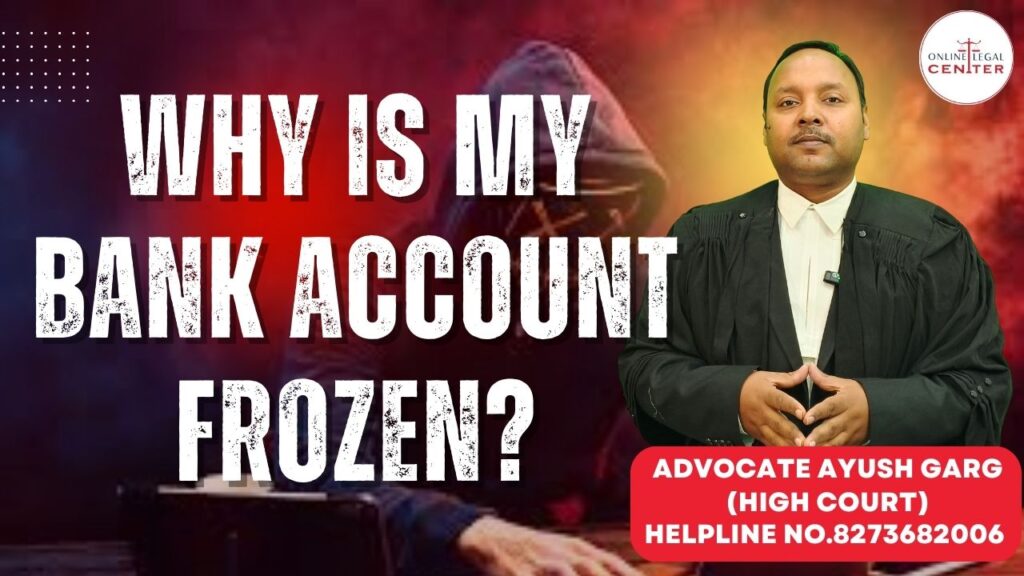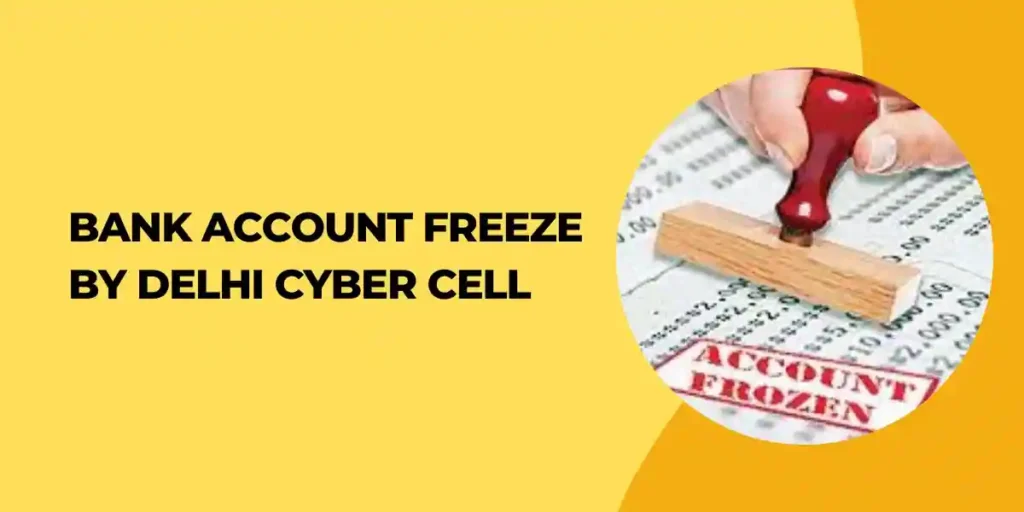Discovering that your bank account is frozen can be an unsettling experience. It’s inconvenient, and if you’re unprepared, it might take time to regain access to your funds. Understanding the reasons why this might happen and knowing how to resolve the issue is crucial. In this article, we’ll explore the common reasons why banks freeze accounts, the legal implications, and steps to take if it happens to you.
HELPLINE NUMBERAdvocate Ayush Garg, a distinguished legal expert, has guided numerous individuals in understanding and resolving banking and financial disputes. His expertise provides clarity and actionable solutions to those facing issues such as frozen bank accounts. In this article, we draw insights from his experience to help you navigate this challenging situation.
HELPLINE NUMBERWhat Does It Mean When Your Account Is Frozen?
A frozen bank account means you are unable to access your funds or conduct transactions. The bank temporarily restricts withdrawals, transfers, or any other movement of money in or out of the account.
This action is usually taken for legal or regulatory reasons to protect the account holder, the bank, or third parties. While your money remains in the account, it cannot be accessed until the issue causing the freeze is resolved.
HELPLINE NUMBERसावधान रहें: Cyber Fraud के जाल में फंसने से कैसे बचें? 9760352006
Reasons Why Your Bank Account May Be Frozen
1. Unpaid Debts or Legal Judgments
One of the most common reasons for a frozen bank account is unpaid debts or legal judgments against you. If a creditor wins a lawsuit for unpaid bills or loans, they can obtain a court order to freeze your account. This legal action, known as a garnishment or levy, allows creditors to claim money directly from your account to settle the debt.
HELPLINE NUMBERHow It Happens:
- A creditor files a lawsuit for unpaid debts.
- If the court rules in their favor, a garnishment order is issued.
- The bank freezes your account and may transfer funds to the creditor to satisfy the debt.
What You Can Do:
- Check for any notices from the court or your creditor.
- Consult a lawyer to challenge the garnishment if you believe it was issued in error.
- Negotiate a payment plan to resolve the debt and lift the freeze.
2. Suspicious or Fraudulent Activity
Banks are required to monitor accounts for unusual or suspicious activity. If your account is flagged for potentially illegal activities, such as fraud, money laundering, or identity theft, the bank may freeze it as a precautionary measure.
Examples of Suspicious Activities:
- Large, unexpected deposits or withdrawals.
- Transactions in high-risk regions or countries.
- Multiple failed login attempts or unauthorized access.
What You Can Do:
- Contact your bank immediately to understand why your account was flagged.
- Provide any requested documentation to verify your identity or the legitimacy of your transactions.
- If you suspect fraud, file a report with the authorities and work with your bank to secure your funds.
3. Unpaid Taxes or Child Support Obligations
Government agencies, such as the IRS in the United States, have the authority to freeze bank accounts for unpaid taxes. Similarly, state agencies can freeze accounts for overdue child support payments.
How It Happens:
- If you owe back taxes, the IRS may issue a tax lien or levy to seize funds from your account.
- Failure to pay child support can result in a court order that freezes your bank account.
What You Can Do:
- Contact the relevant agency to understand the amount owed.
- Set up a payment plan to settle the debt.
- Consult a legal professional if you need assistance negotiating with the agency.
4. Court Orders or Legal Proceedings
Apart from garnishments, banks may freeze accounts due to other legal proceedings. For example, if you’re involved in a lawsuit, divorce settlement, or bankruptcy, a court may issue an order to freeze your assets until the matter is resolved.
What You Can Do:
- Consult your legal representative to understand the scope of the court order.
- Follow the court’s instructions to resolve the matter and lift the freeze.
5. Account Verification Issues
Sometimes, banks freeze accounts for reasons unrelated to legal or financial disputes. For instance, if there are discrepancies in your account information or if your account hasn’t been verified properly, the bank may temporarily restrict access until the issue is resolved.
Examples:
- Mismatch in your name or Social Security Number.
- Failure to provide updated KYC (Know Your Customer) documents.
What You Can Do:
- Submit the required documents to verify your account.
- Update your personal information if necessary.
- Contact your bank to expedite the process.
Steps to Take If Your Bank Account Is Frozen
1. Contact Your Bank Immediately
The first step is to call your bank’s customer service or visit a branch to understand why your account was frozen. Banks are typically transparent about the reason and will provide guidance on how to resolve the issue.
2. Gather All Relevant Documents
Depending on the reason for the freeze, you may need to provide documents such as:
- Proof of identity.
- Legal documents (e.g., court orders, debt settlement agreements).
- Transaction records to clarify suspicious activities.
3. Address the Underlying Issue
Resolving the cause of the freeze is crucial. This might involve:
- Paying off outstanding debts or taxes.
- Submitting missing documents or updating account information.
- Providing evidence to dispute fraudulent claims.
4. Seek Legal Advice
If the freeze is due to legal action, consulting with a lawyer is highly recommended. They can help you understand your rights, negotiate with creditors, or file a motion to release the freeze.
5. Monitor Your Account Regularly
Once the freeze is lifted, stay proactive by monitoring your account for any unusual activity. Consider setting up alerts for large transactions or changes to your account status.
HELPLINE NUMBERPreventing Your Account from Being Frozen
While some situations are unavoidable, there are steps you can take to reduce the risk of your bank account being frozen:
- Stay Current on Payments: Pay your debts, taxes, and child support obligations on time to avoid garnishments or levies.
- Monitor Your Account Activity: Regularly review your transactions for any suspicious activity.
- Keep Your Information Updated: Ensure your bank has accurate and up-to-date personal information.
- Communicate with Creditors: If you’re struggling to make payments, reach out to creditors to negotiate a repayment plan before legal action is taken.
- Follow Banking Rules: Avoid exceeding withdrawal limits or making transactions that could trigger fraud alerts.
Frequently Asked Questions
1. Can I Still Deposit Money into a Frozen Account?
In most cases, you can deposit money into a frozen account, but you won’t be able to withdraw funds or make transactions until the freeze is lifted.
2. How Long Does It Take to Unfreeze an Account?
The timeline depends on the reason for the freeze. It can take anywhere from a few days to several weeks, depending on how quickly you address the underlying issue.
3. Will My Bank Notify Me Before Freezing My Account?
Banks are not always required to notify you in advance, especially in cases involving court orders or fraud investigations. However, you’ll typically receive communication after the freeze is implemented.
Conclusion
A frozen bank account can be a frustrating experience, but understanding the reasons behind it and knowing the steps to take can help you resolve the issue quickly. Whether it’s due to unpaid debts, suspicious activity, or legal orders, addressing the root cause and working with your bank or legal advisors is key. Stay proactive, keep your account information updated, and monitor your finances to minimize the risk of facing a freeze in the future.
HELPLINE NUMBERBest Bank Account Unfreeze Lawyer in Gwalior
HELPLINE NUMBERAlso Connect with us on :
Facebook –  / officialonlinelegalcenter :-
/ officialonlinelegalcenter :-
Instagram –  / officialonlinelegalcenter :-
/ officialonlinelegalcenter :-
Twitter –  / onlinelegalcen :-
/ onlinelegalcen :-
Telegram – https://t.me/onlinelegalcenterr :-
Whatsapp Number – 08273682006 :-
Contact Number – 08273682006, 09760352006 :-
Email Id – info@onlinelegalcenter.com







